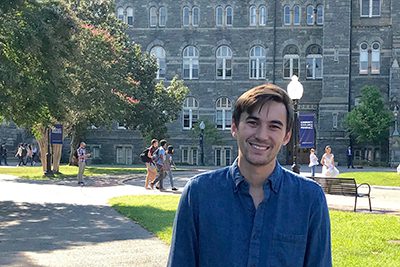December 4, 2018
 MPA’s college counseling process is driven by careful consideration of each student’s unique set of interests, priorities, and aspirations, balanced with an understanding of the current college admission landscape. MPA alumni Andrew Guiang ’08 shares the most valuable part of the college search process at MPA and how it prepared him for his future. Read the Q&A with Andrew below and more about college counseling at MPA here!
MPA’s college counseling process is driven by careful consideration of each student’s unique set of interests, priorities, and aspirations, balanced with an understanding of the current college admission landscape. MPA alumni Andrew Guiang ’08 shares the most valuable part of the college search process at MPA and how it prepared him for his future. Read the Q&A with Andrew below and more about college counseling at MPA here!
Q: What was the most valuable part of the college search process at MPA? What did you appreciate about MPA’s approach?
A: I liked that, at MPA, it’s cool to be smart, and that fact makes applying to college that much easier. I also like that MPA has a good mix of people who stay local or go away for college, which makes the application process less stressful, since there’s no pressure to choose one region over another.
Q: Once you left for college, did you feel prepared?
A: Without a doubt, the most valuable part of an MPA education is the writing instruction. When I showed up for college, I had all the writing skills I needed to be successful. That fact stemmed from several unique things about how MPA educates its students. First, MPA students just do a lot more writing than students at other schools. At MPA, writing is not a skill confined to just a few small assignments in a few English classes; it’s a crucial part of every aspect of the curriculum. There’s writing assignments in science class, in history class, in seminars, and so on. Second, MPA exposes students to many different types of writing. We learned the classics—Shakespeare, Dickens, Faulkner—but we also read works by authors from other parts of the world, with many different experiences and with varying levels of fame and success. The diversity of this curriculum exposed us to many different styles, themes, and general approaches to writing, which in turn gave us a greater knowledge from which to draw when we did our own writing. Third, and finally, MPA actually teaches students how to write. When I showed up in college, there were many students who were still stuck on five paragraph essays. At MPA, however, my teachers had encouraged me to structure my essays in more creative, dynamic, and effective ways.
In my first year of law school, I had to enroll in a legal writing course, which covered proper grammar and effective sentence structure. While much of the material was completely new to my classmates, much of it was the same thing I had learned in eleventh grade with Ms. Slocum. Although it’s not like she was teaching us to write a cert. petition, she did instill valuable skills, like how to avoid both the passive voice and excessive use of adverbs. In short, I learned not only how to use compelling language, but also how to put that language into effective sentences, and then organize those sentences into a cohesive whole. This is just not something that people learn at other schools—at least not to the same extent. And that’s why the writing curriculum at MPA has proved so valuable. I’m very thankful for all the work my teachers did! They’re the best!